Mercy
“She asks me to kill the spider.
Instead, I get the most
peaceful weapons I can find.
I take a cup and a napkin.
I catch the spider, put it outside
and allow it to walk away.
If I am ever caught in the wrong place
at the wrong time, just being alive
and not bothering anyone,
I hope I am greeted
with the same kind
of mercy.”
― Rudy Francisco, Helium
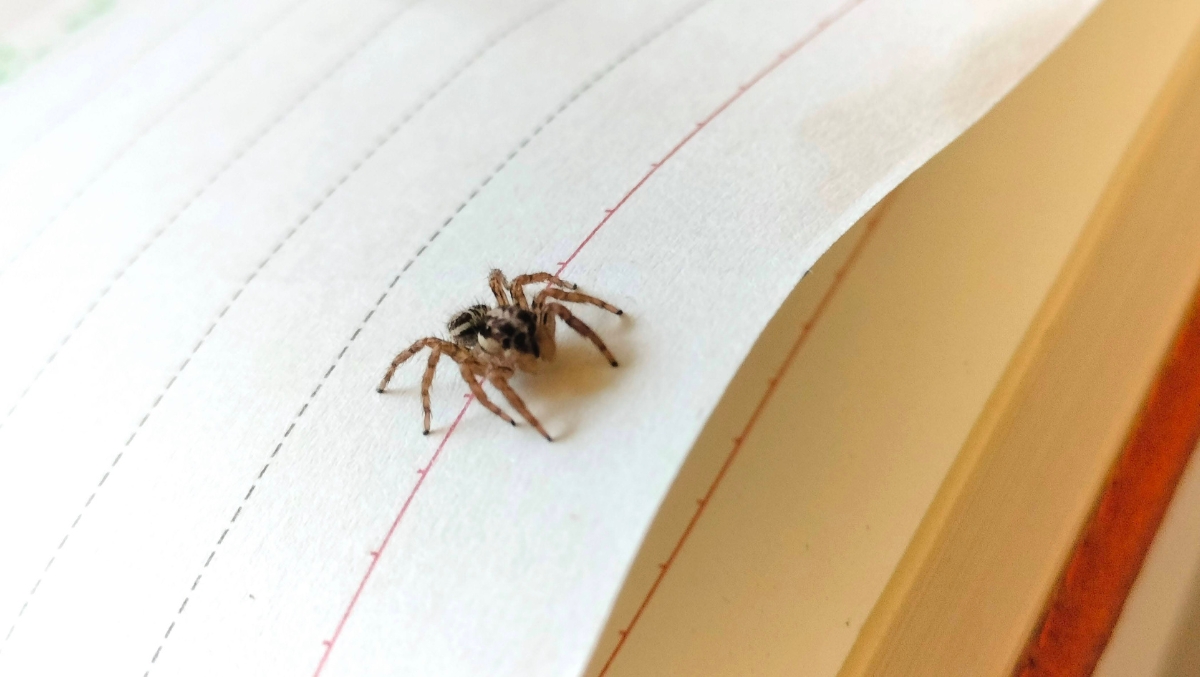
Pantropical jumping spider (Plexippus paykulli) © Purva Variyar
Whack-whack-whack…! The sudden loud noises emanating from right outside my front door caught me off-guard on a Sunday afternoon. I hurried to check on the source of the commotion. Upon opening the door, I was confronted by a strange sight of a frightened mail delivery man feverishly hitting something on the wall with his footwear. Whack-whack-whack. To my dismay he was killing one of the most beautiful specimens of a longhorn beetle I had ever seen.
Aghast, I rudely asked him to stop and asked why he was hitting the poor creature. ‘Khatarnak dikhta hain. Kaant lega’! (It looks dangerous and may bite someone!), he exclaimed now slightly embarrassed. I bent down to pick up the fallen beetle to check on it. I already knew it was dead. I also knew that it wasn’t the mail man’s fault.
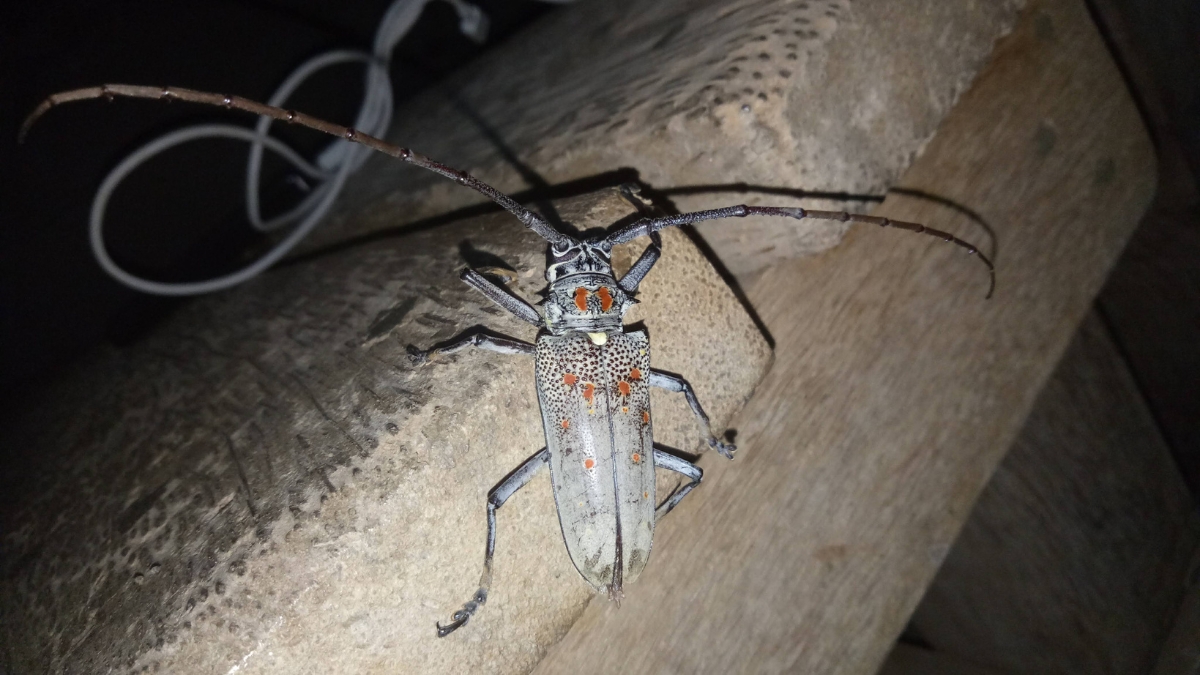
Longhorn beetle (Mango stem borer) Batocera rufomaculata © Purva Variyar
Aversion to insects, spiders, and several other arthropods and reptiles – due to lack of knowledge, poor awareness, misinformation, superstitions, wrongful depictions in books and television, etc. – has become sorely ingrained in most of us. I took the opportunity to explain to him that the longhorn beetle is harmless and feeds exclusively on plant matter! Its long, graceful antennae may have seemed ‘menacing’ to him. Just like many of us who, through modern-day social conditioning, have become hardwired to regard insects, spiders, centipedes, house geckos, etc. as lesser beings, pests, dirty, and dangerous (even if they are not).
If only, all of us were taught about the incredibly critical role these little creatures play in keeping the balance of the food chain and in the functioning of ecosystems, and to appreciate them. If only the ongoing global collapse of insect populations and species extinction was taken seriously and received its fair share of media coverage so that people woke up to the alarming reality. If only we understood that our lives, food, oxygen, and climate are inextricably linked to the services they provide. May be then we would view and treat insects and other creatures, including those which inadvertently enter our homes and share space with us, with much more respect.
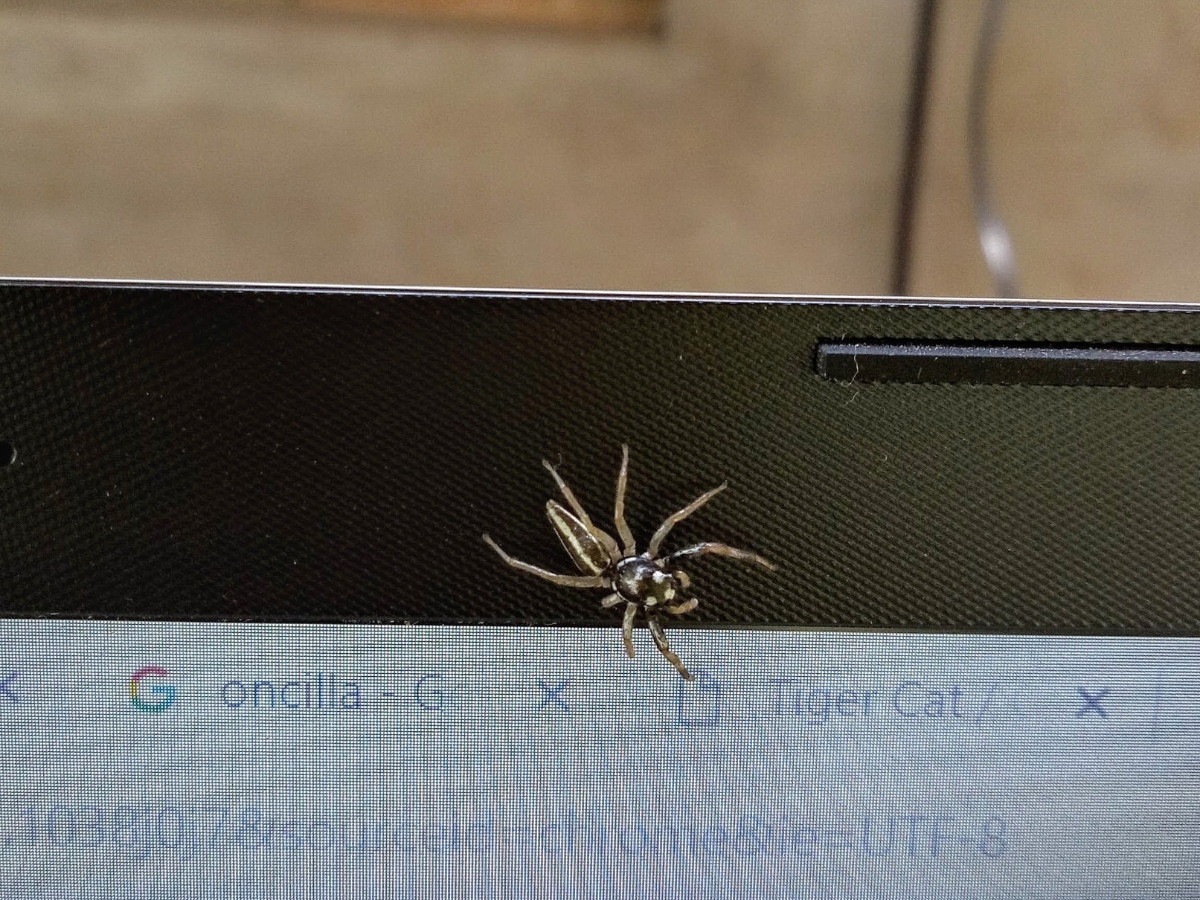
Jumping spider (family Salticidae) © Purva Variyar
Many people often reminisce about how as children, they would ‘play’ with butterflies, dragonflies, and other small creatures, not realising that plucking out their wings or tying strings to their bodies, etc. for fun, must have been extremely painful and agonizing for those animals. Even as adults, most people fail to recognise insects and other critters as intelligent, sentient creatures. Very recently, a team of neuroscientists at Princeton University, finished mapping all the neurons in an adult female fruit fly’s brain, a first for any animal. The neuroscientists themselves were taken aback by the complexity of the insect’s brain, its sensory functioning, and interconnectivity of neurons. Fruit flies are known to be intelligent animals capable of forming complex long-term memories, alerting each other of incoming dangers, thinking, making decisions, and other such advanced cognitive functions. Only now are we beginning to discover and grasp the depth of intelligence in insects and other non-humans.
I Rescue Insects, Spiders, and Other Creatures.
In this world besieged by humans and altered by humans, insects and spiders often enter spaces where people are not tolerant of them, or find themselves trapped in artificial spaces not knowing how to escape. Every time I find ants, moths, bugs, or spiders helplessly swimming around in my cat’s water bowl, I must intervene. After all that plastic bowl with its artificial, unnaturally smooth surface is a trap for these critters. It does not provide any grip onto which to hold on and haul themselves out of water. I offer my finger to them to cling onto with their tired bodies and place them on safer grounds, hoping that once they catch their breath and dry off, they will be okay to go about their way. To prevent this from happening again, I have placed large stones in the water bowls as well as in the water hole for birds in my balcony, in such a way that they protrude slightly above water. Since then, I haven’t found dead insects floating in the bowls. This arrangement also allows insects to land safely on the stone and have a drink! This is a lifesaver for many insects, particularly during the hot summer days.
I see a moth lying on the road because its wings are soaking wet and sticky from the rains, I have to pick it up before it gets run down by vehicles or trampled under human feet, and lay it down on a plant nearby. I see an inactive butterfly on a cold day on a busy railway platform floor, I need to move it out of harm’s way. Or if I see a bee buzzing desperately against a glass wall or a window pane trying to get out, I have to set it free. I discourage my cats from attacking any insect or gecko that enters my home. I leave the tent web spider webs in my balcony alone and am fiercely protective of them especially when have laid eggs. A couple of now abandoned paper wasp nests in my home are still untouched, and are reminiscent of the pleasure it gave me to share space with the hard-working wasps. Over the years, I have come to become more aware and sensitive to the presence of insects and other such creatures in my immediate surroundings. My ‘insecty-spidey’ radar is always on.
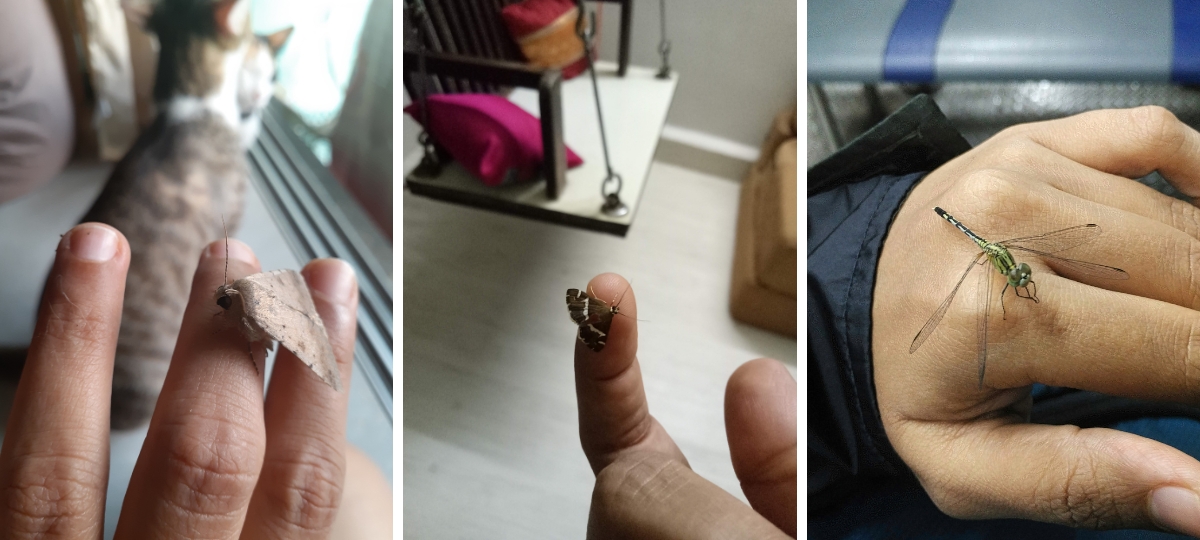
©Purva Variyar
Having said that, not all insects or spiders that you see need our help or rescuing. Most often they just need to be left alone. Understanding and respecting this distinction is very important. Also, you must not be foolhardy when it comes to handling or interacting with insects and spiders in order to help them. Some of them can inflict toxic bites or sting, while some may be poisonous. Read and educate yourself about insect and arthropod behaviour, ecology, and simple, safe ways to rescue or relocate them, to avoid hurting them and yourself.
Why You Should Help Insects Too.
There is very real a “bug apocalypse” underway. Populations of over 40 percent of insect species are on a precipitous decline, and a third of them are endangered. To understand the scale of the problem better, here is another disturbing statistic. In the last 150 or so years, between 2,50,000 and 5,00,000 species of insects went extinct. Around one million more are on the brink. Deforestation largely due to intensive agriculture and urbanisation, unchecked use of pesticides, light pollution, and climate change are the major factors contributing to the fall in insect numbers.
The knock-on effects of this dystopian ‘global insect meltdown’ are disastrous, especially for other animals such as spiders, birds, bats, geckos, etc. who feed on them. With insects gone, these insectivorous species would literally starve. Studies from different parts of the world show that insectivores such as the aerial web-spinning spiders which depend on flying insects for food have been affected by insect population decline.
Over 80 percent of wild plants directly depend on insects for pollination. Certain plants have evolved to allow only a particular species of insect to pollinate it, and many insects have adapted to feed on and even lay eggs on just very specific species of plants. The fate of these specialists hangs in the balance. And ours too. About 75 percent of the world’s crops are pollinated by insects, a service which is valued at nearly $600 billion. With the insect population on the decline, our very own food security is on the line!
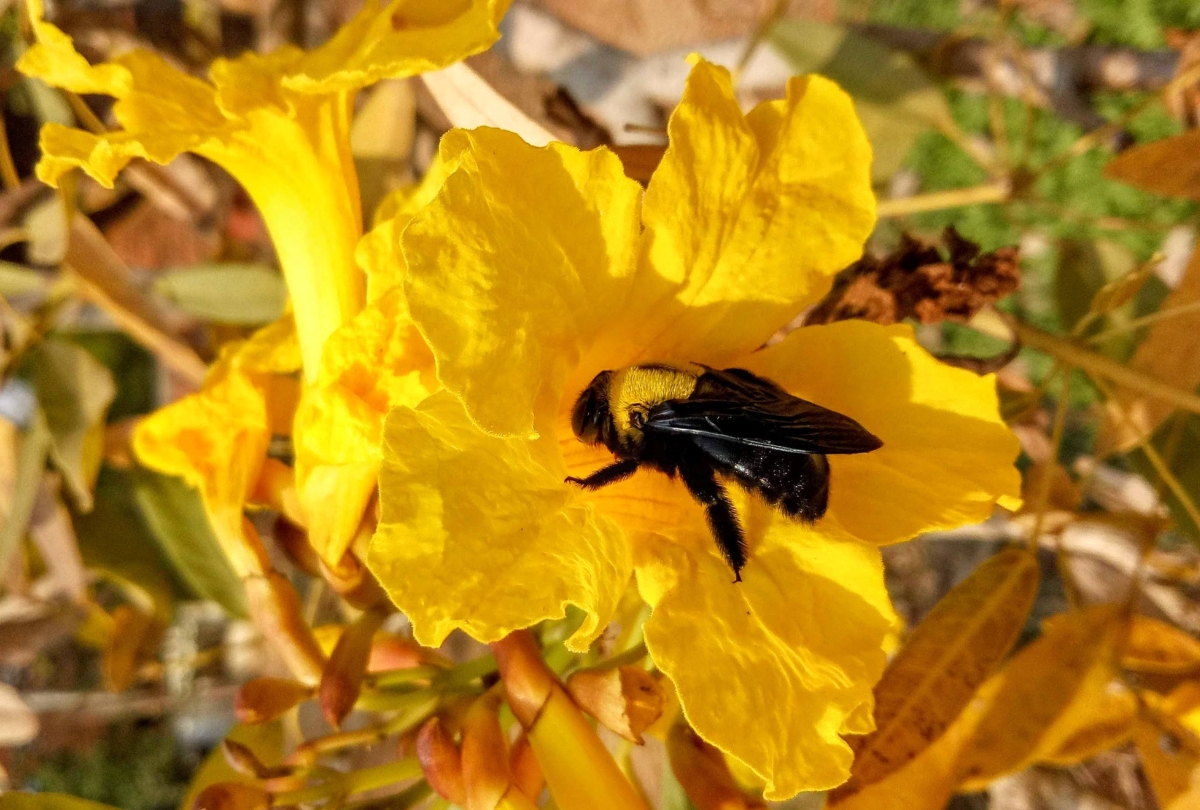
Carpenter bee. © Purva Variyar
“If we don’t stop it, entire ecosystems will collapse due to starvation,” researcher Francisco Sánchez-Bayo tells National Geographic regarding the staggering loss of insects across the globe. That’s a chilling warning.
Although, houseflies, cockroaches, mosquitoes are an exception, and their numbers may be on the rise for all the wrong reasons, thanks to human activities. Here is where we can appreciate the spiders, geckos and other nature’s ‘pest’ controllers! (I hate the term ‘pest’). They are effective predators who keep the populations of insects and other arthropods in check, providing a vital service.
In this era of human-made global biodiversity crisis, better known as the Sixth Mass Extinction, each moth, butterfly, beetle, ant, and spider counts, even more so. It is necessary that we change our worldview to recognise and appreciate these small creatures who play a big role in healthy functioning of our ecosystems. And even help those in distress.
Not recognizing a bee
A ten year old boy does not recognize a bee
a bee truly for a bee
scraping a glass window with bushy feet
it does not occur to show her a way out
He has not learnt that she makes delicious pollen-cakes,
that his breakfast that day was mostly buzz-made
or that she often has nightmares of nitrofen and glyphosate
He’s yet to hear stories of how she raised his society
caring for her larvae, toiling to find them food
or that she lives in bamboo-stem sisterhoods
that she prefers crown-flowers over coat-button daisies
and gusty winds drive her crazy
He does not know all the flowers
who’ll refuse to seed till they hear her sing
or that starve means to see bee only as sting
Before he can be shown the kindness of a sheet and a cup
he’s learnt to reach for newspaper and roll it up.
–Yuvan Aves, naturalist, writer, educator
About the author:
Purva Variyar is a wildlife conservationist, science writer and editor, and heads WCT’s Communications vertical. She has previously worked with the Sanctuary Nature Foundation, and The Gerry Martin Project.
Disclaimer: The author is associated with Wildlife Conservation Trust. The views and opinions expressed in the article are her own and do not necessarily reflect the views and opinions of Wildlife Conservation Trust.
Your donations support our on-ground operations, helping us meet our conservation goals.
Related Links
- The Perilous Love of Spiders
- Mouthing with the Insects
- Quadripartite Association
- In Praise of Spider Silk
- Between Rock and a Hard Place
